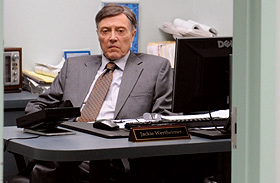Reviews
Dark Horse | Review
Solondz does arrested development.
The latest from provocative filmmaker Todd Solondz, Dark Horse, seems deceptively simple, already touted as one of his most accessible films. However, although this film’s subject matter may be more comfortable for mass consumption than past Solondz films, its simplicity is only skin deep and its nightmarish melancholy isn’t as simple to casually term as more or less accessible. While it’s not Solondz’s strongest or best feature, it’s an earnestly rendered film and it is of course, filmed with his offbeat, trademark style.
The dark horse of the narrative is Abe (Jordan Gelber), a manchild suffering from an overt case of arrested development. He lives with his parents (Christopher Walken and Mia Farrow) and wastes everyone’s time in a prime position at his father’s business, and is often reminded that he failed to manage to do anything with his life. His younger brother, Richard (Justin Bartha), is a successful physician and the two are not on speaking terms. The film begins at a Jewish wedding where Abe meets the morose but beautiful Miranda (Selma Blair), her character an “extension†of Vi, the character she played in Storytelling (2001). Instantly smitten, he finagles her phone number, even though she’s obviously not interested. She allows him to come over and visit her (she also lives with her parents and seemingly addled with antidepressants) and he proposes marriage. Because she says she wants to want him, she agrees. At the same time, Abe’s father is becoming increasingly upset with him at work, often firing him and/or threatening to kick him out of the house. His father’s secretary (Donna Murphy) often picks up the slack for Abe at work. We get to see a great many of Abe’s complicated dreams, where he envisions the secretary as a tough, wise talking dame a la Barbara Stanwyck, where she tells him harsh truths about his uselessness, the direct opposite of his real mother, a sweet as pie Mia Farrow who doesn’t ever want her son to grow up.
The trouble with Abe is that he’s an extremely abrasive and immature character, so wrapped up in his own selfishness that it is difficult to like him. He’s an out and out loser who refuses to acknowledge it. Furthermore, his emotionally destructive relationship with the chronically depressed Miranda only darkens the tale, though some of the most deliciously funny moments arise in their interactions (as upon learning she has hepatitis, Abe’s interest in her begins to flounder). While the subject matter may be accessible, the complicated and symbolic dream sequences seem more like amusing nightmares, where Abe experiences truths about himself he never owns up to in real life. But the clincher is the final sequence, especially in relation to the title. A dark horse is something no one sees, something no one saw coming. Is Abe still a dark horse by the closing frame? And while this may not be Solondz’s strongest piece, it may very well fit the bill as a dark horse in his filmography.
Reviewed on September 11 at the 2011 Toronto Int. Film Festival – SPECIAL PRESENTATIONS Programme.
85 Mins.
Rating 3.5 stars
























